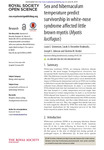Please use this identifier to cite or link to this item:
http://lib.hpu.edu.vn/handle/123456789/21739| Title: | Sex and hibernaculum temperature predict survivorship inwhite-nose syndrome affected little brownmyotis |
| Authors: | Grieneisen, Laura E. Brownlee-Bouboulis, Sarah A. Johnson, Joseph S. |
| Keywords: | Biology Ecology Epidemiology Behaviour |
| Issue Date: | 2015 |
| Publisher: | The Royal Society |
| Abstract: | White-nose syndrome (WNS), an emerging infectious disease caused by the novel fungus Pseudogymnoascus destructans,has devastated North American bat populations since its discovery in 2006. The little brown myotis,Myotis lucifugus, has been especially affected. The goal of this 2-year captive study was to determine the impact of hibernacula temperature and sex on WNS survivorship in little brown myotis that displayed visible fungal infection when collected from affected hibernacula. In study 1, we found that WNS-affected male bats had increased survival over females and that bats housed at a colder temperature survived longer than those housed at warmer temperatures. |
| URI: | https://lib.hpu.edu.vn/handle/123456789/21739 |
| Appears in Collections: | Education |
Files in This Item:
| File | Description | Size | Format | |
|---|---|---|---|---|
| 0120_Sexandhibernaculum.pdf Restricted Access | 405.8 kB | Adobe PDF |  View/Open Request a copy |
Items in DSpace are protected by copyright, with all rights reserved, unless otherwise indicated.
